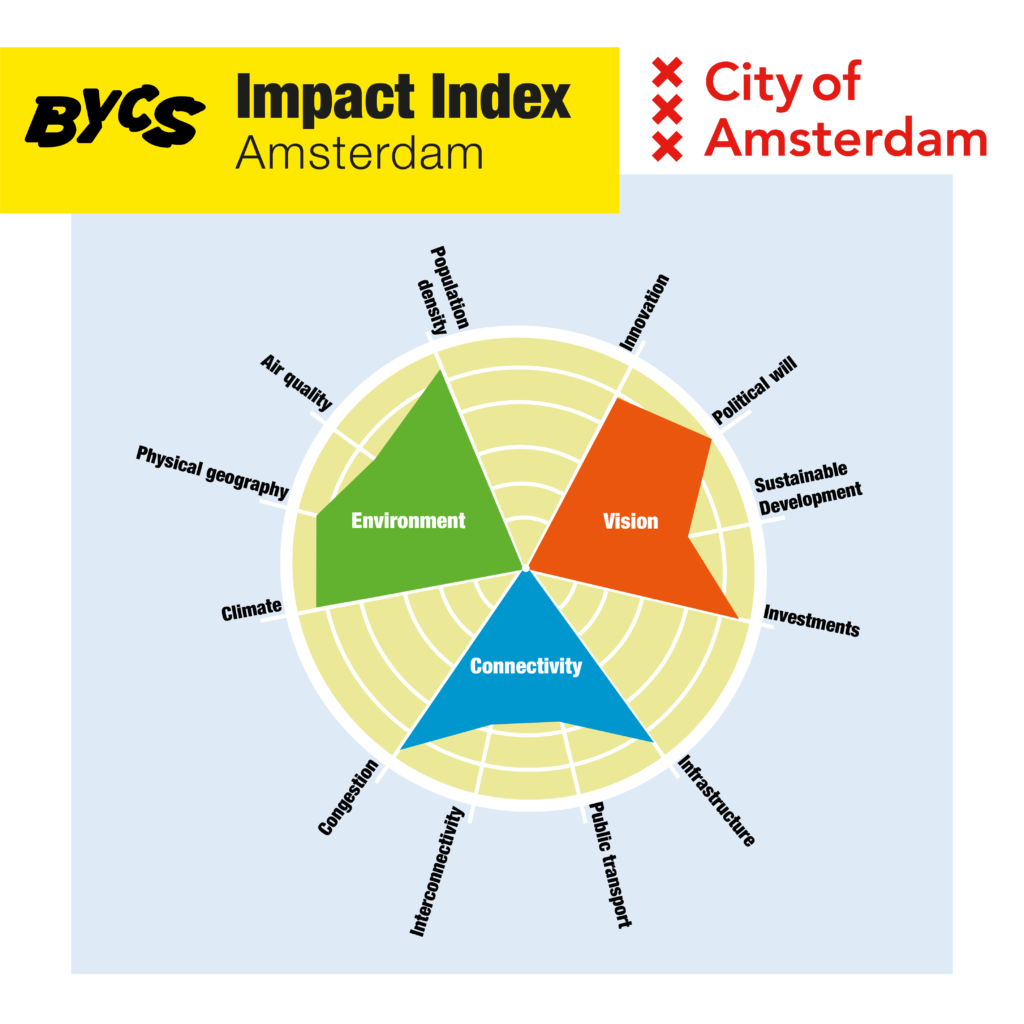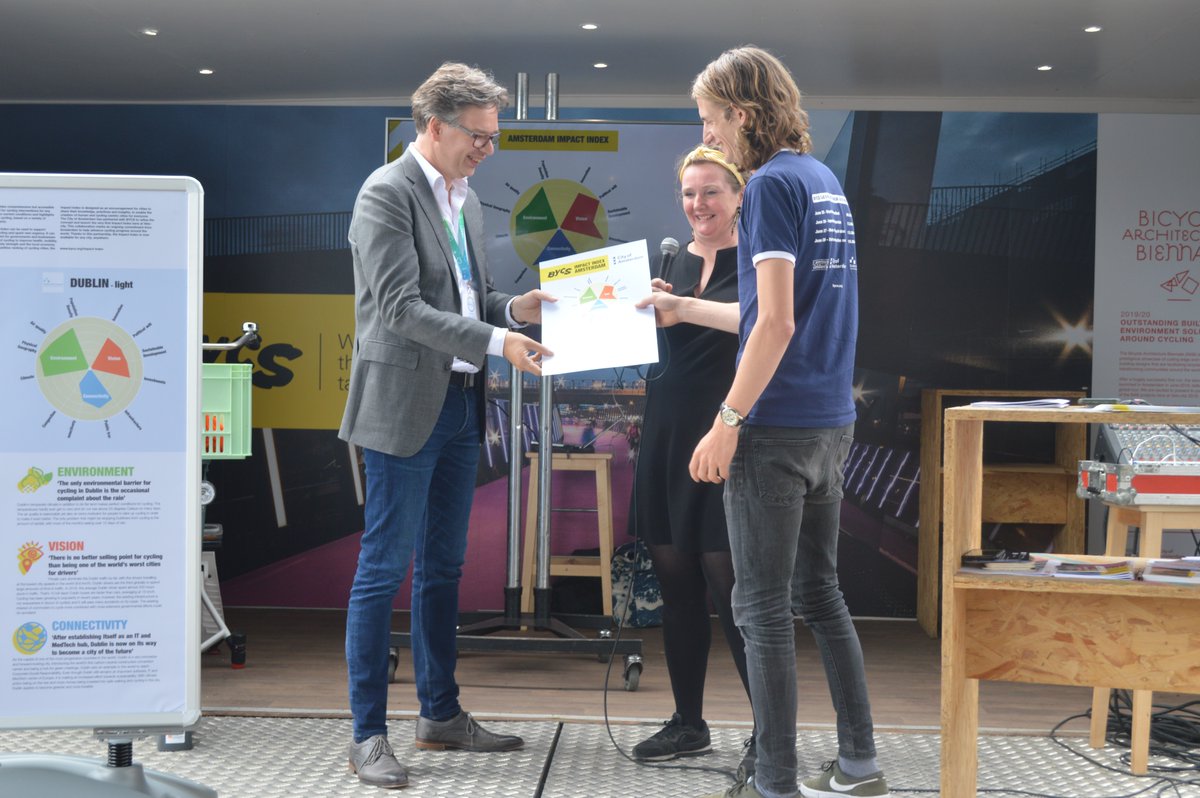BYCS launches tool to help cities plan sustainable transformation through cycling at Velo-city. Tool developed with the City of Amsterdam and now available to all cities
Dublin, 27 June 2019
Any city, anywhere can now get fast, targeted guidance on how to accelerate cycling progress thanks to a new tool called ‘Impact Index’ by BYCS. The tool has been developed with the support of the City of Amsterdam, and is being launched this week at the leading international cycling festival, Velo-city.
BYCS’ Impact Index provides comprehensive but accessible insights on current conditions and opportunities to increase cycling in a city in ways that lead to sustainable transformation. The tool uses open-source geographical, socio-economic and mobility data to succinctly identify and visually represent enormous opportunity spaces for cities. The results can help governments and other organizations to act on the potential of cycling to improve health, mobility, the environment, community strength and the local economy.
Instead of forming a competitive ranking of cycling cities, the Impact Index is designed – by using a consistent but flexible methodology and framework – to not only help individual cities (including where zero or little cycling culture exists) but also to encourage them to share their knowledge, practices and insights. This ensures cities can learn from one another and understand where they stand in relation to other cities struggling with similar challenges. It also provides an opportunity for these cities to market themselves as taking cycling progress seriously.
Maarten Woolthuis, Co-founder of BYCS, said:
Increasing cycling is a proven way to tackle many urban challenges, and the possibilities for the bicycle to become viable transportation options in cities are endless. The BYCS Impact Index shows where most impact can be made with minimal effort. And by looking at the broader issues affecting a city, we can provide unexpected ideas that spark new ways of thinking. Crucially, the Impact Index also encourages knowledge sharing and collaborations across cities, regardless of size, geographical situation, culture, and cycling experience. In this way, we hope to radically accelerate cycling progress around the world.
The tool has been refined via small pilots developed on Mexico City and Dublin. A first full scale version was then applied on Amsterdam with the support of the municipality, and officially launch it at Velo-city. Whilst the Impact Index tool is still developing, thanks to the collaboration with Amsterdam, it is now ready to be used by other early-adopter cities around the world. Plans for the next stage of the tool include a comprehensive digital dashboard.

Whilst Amsterdam is already one of the most advanced cycling cities in the world, it partnered with BYCS on the Impact Index to provide a simple case to show other cities how the tool works and its potential to help them. The Amsterdam Impact Index indicates that the city scores very highly on the opportunity for cycling provided by the physical environment, political will and innovation culture. But it does include recommendations for further progress. These include:
quickly forming new connections across the large body of water – the Ij – that divides the city and currently requires cyclists to use ferries
investing in more programs that connect cycling to sustainable development plans piloting programs that reduce city centre vehicle transport, particularly for logistics investing in ways to distribute the success of cycling more evenly across the city (with numbers lower outside the crowded city centre), to help these communities tackle social mobility and obesity
David Gelauff, Head of the Amsterdam Bicycle Program at the City of Amsterdam, said:
As the City of Amsterdam, we know we are a frontrunner in a number of elements of a bicycle culture and cycling infrastructure. And as a responsible capital, we want to share our knowledge with others – we hope in this way to also gain new insights from other cities. This is why we wanted to be the first city to participate in the BYCS Impact Index. Through this we also demonstrate that we are still facing challenges, and that might give other cities something to reflect on, maybe even lead to ideas on how to do things differently. When you have always been the biggest cycling city of Europe, maybe even the world, there are a lot of things you simply take for granted and we can always benefit from a fresh perspective.
BYCS is active in Dublin all week as part of Velo-city, operating a pop-up ‘BYCS Lab’ to allow people to share insights, create new innovations and meet other changemakers. It is also showcasing a mini version of its new Bicycle Architecture Biennale (a showcase of inspiring new designs for future cycling cities). Also this week, inaugurated its 50th Bicycle Mayor, with Dublin becoming the latest city to join the fast-growing network of city cycling changemakers.
Any city wishing to adopt the Impact Index is encouraged to contact BYCS.
More information on the Impact Index head over to the project page.

